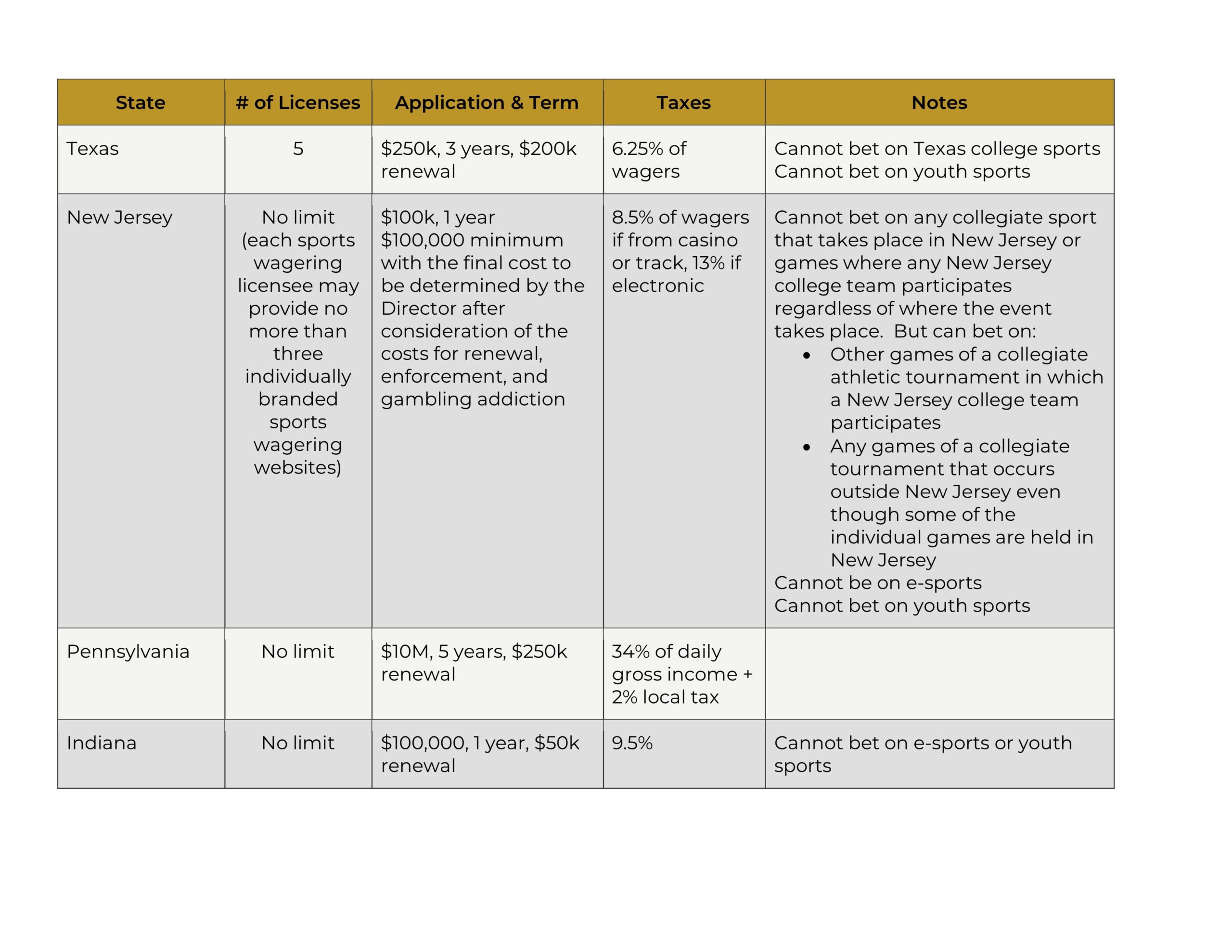Texas Sports Betting Bill – H.B. 1121
June 17, 2021 | By Kevin Vela
A recent bill authorized by Representative Harold Dutton of Houston on January 12, 2021 seeks to legalize sports betting in Texas. The bill aims to allow authorized permit holders to offer sports betting through their designated electronic platforms. The Texas Department of Licensing and Regulation (hereafter “TDLR”) would be responsible for implementing and administering the program, in addition to promulgating regulations and producing annual reports regarding revenue streams and any other recommendations for the governor.
The proposed bill, H.B. 1121, will allow sports betting operators to apply for a nontransferable permit to conduct sports betting activities in Texas. The application process is comprehensive and involves several requirements. Namely, applicants must submit the requisite forms, a fee of $250,000, a background check, and information relating to the applicant’s experience in sports betting, wagering activities, and proposed internal controls.
The bill only allows for a total of five permits. If there are more applications than available permits, TDLR is to consider a list of factors included in the bill. For applicants that are granted a permit, they must execute a bond cosigned by a surety company before the permit’s issuance.
Permits are valid for three years and must be renewed to continue operations. Renewal requires permit holders to file the requisite renewal forms and submit a renewal fee of $200,000. TDLR is responsible for evaluating renewal applications.
The bill also regulates the permit holder’s activities by imposing specific duties on each permit holder. Among others, these duties include taking reasonable steps to:
- Ensure only individuals physically located in Texas can place bets on its platform
- Protect the confidential information of their users
- Prevent prohibited betting under this bill or any other Texas law
- Establish procedures to detect and report suspicious or illegal betting activity
Permit holders must also keep detailed records related to their users, information on the bets placed, and suspicious activities. The permit holder must provide this record to the TDLR upon request, at least until the third anniversary. Additionally, TDLR may establish rules regarding liquidity pools of permit holders to offset losses and manage risks.
In terms of substantive regulations, there is a 6.25% tax on each bet. The revenue from the tax goes toward the foundation school fund. The minimum age to place a sports bet is 21 and accepting bets by those under the age of 21 can carry civil or criminal penalties, which may include suspension or revocation of the permit or a $1,000 fine for each violation. Additionally, the bill prohibits members, officers, or employees of the TDLR; a permit holder’s entity; or any entity working directly on a contract relating to sports betting with the TDLR from placing bets. Similarly, coaches, athletes, trainers, employees, team owners, and referees cannot place bets on athletic events in which they are involved.
Lastly, the bill allows sports betting on both college and professional athletic events, not including horse or greyhound racing. Texas college sports, however, are specifically excluded from permissible athletic events that users may bet on. The bill also excludes youth sports from permissible athletic events users may bet on. Accepting bets on Texas college sports or youth events may carry criminal or civil penalties as described above.
The fees ($250k application, $200k renewal every three years, and 6.25% tax) are material, and competition will be fierce for the five permits.
To better understand how the proposed Texas law shapes up with some other states, we’ve included some information on the three states with the most sports betting activity other than Nevada.
New Jersey
New Jersey, which has the largest sports betting handle outside of Nevada, enacted Assembly Bill No. 4111 that legalized sports betting in 2018. The New Jersey bill permits casinos and racetracks to conduct sports betting pools at their brick-and-mortar locations if licensed. Alternatively, casinos may conduct online sports betting activities or authorize a licensed internet sports pool to operate an online sports pool on its behalf if the Division of Gaming and Enforcement approves the terms of the agreement. However, each licensee may provide no more than three individually branded sports wagering websites. Additionally, every five years licensees must submit reports to the Division.
New Jersey taxes are steeper than the one proposed in the Texas bill as an 8.5% tax is imposed for revenue generated at casinos and racetracks and 13% for electronic wagers. Similar to the Texas bill, New Jersey also prohibits betting on New Jersey collegiate teams or athletic events that take place in New Jersey as well as wagers on e-sports. The New Jersey bill also prohibits certain individuals from placing bets such as athletes, owners with an ownership interest above 10%, referees, team employees, but New Jersey also requires operators to implement procedures to ensure the platform or casino does not accept bets by such individuals.
Pennsylvania
Pennsylvania, the state with the second-largest sports betting handle outside of Nevada, enacted H.B. 271 which permits sports betting in Pennsylvania on both collegiate and professional sports. H.B. 271 provides the overarching framework for sports betting by delegating most of the authority of the Pennsylvania Gaming Control Board to promulgate regulations regarding sports betting. Thus, most of the formal rules for licensure and sports betting activities came in subsequent regulations. However, the Pennsylvania bill does set forth some substance. Licenses are good for five years at which point they must be renewed. Pennsylvania requires a $10,000,000 fee and a renewal fee of $250,000 for operators. The bill also imposes a steep tax rate of 34% of the operator’s daily gross income and a 2% local tax. It is important to note that sports betting was initially limited to casinos and racetracks’ physical locations, but in 2019, after the landmark U.S. Supreme Court decision lifting the federal ban on single-game betting, Pennsylvania issued additional regulations permitting online sports betting.
Indiana
Indiana, the state with the third-largest sports betting handle outside of Nevada, enacted H.B. 1015 which legalized sports betting in the Hoosier state. Under that bill, operators must obtain a license, which was expanded to include online sports betting operators. Applications for licensure carry an initial fee of $100,000 and an annual renewal fee of $50,000 for both casinos and online operators. The bill also imposes a 9.5% tax. Like New Jersey, Indiana does not permit betting on e-sports or any event not approved by the Indiana Gaming Commission.


